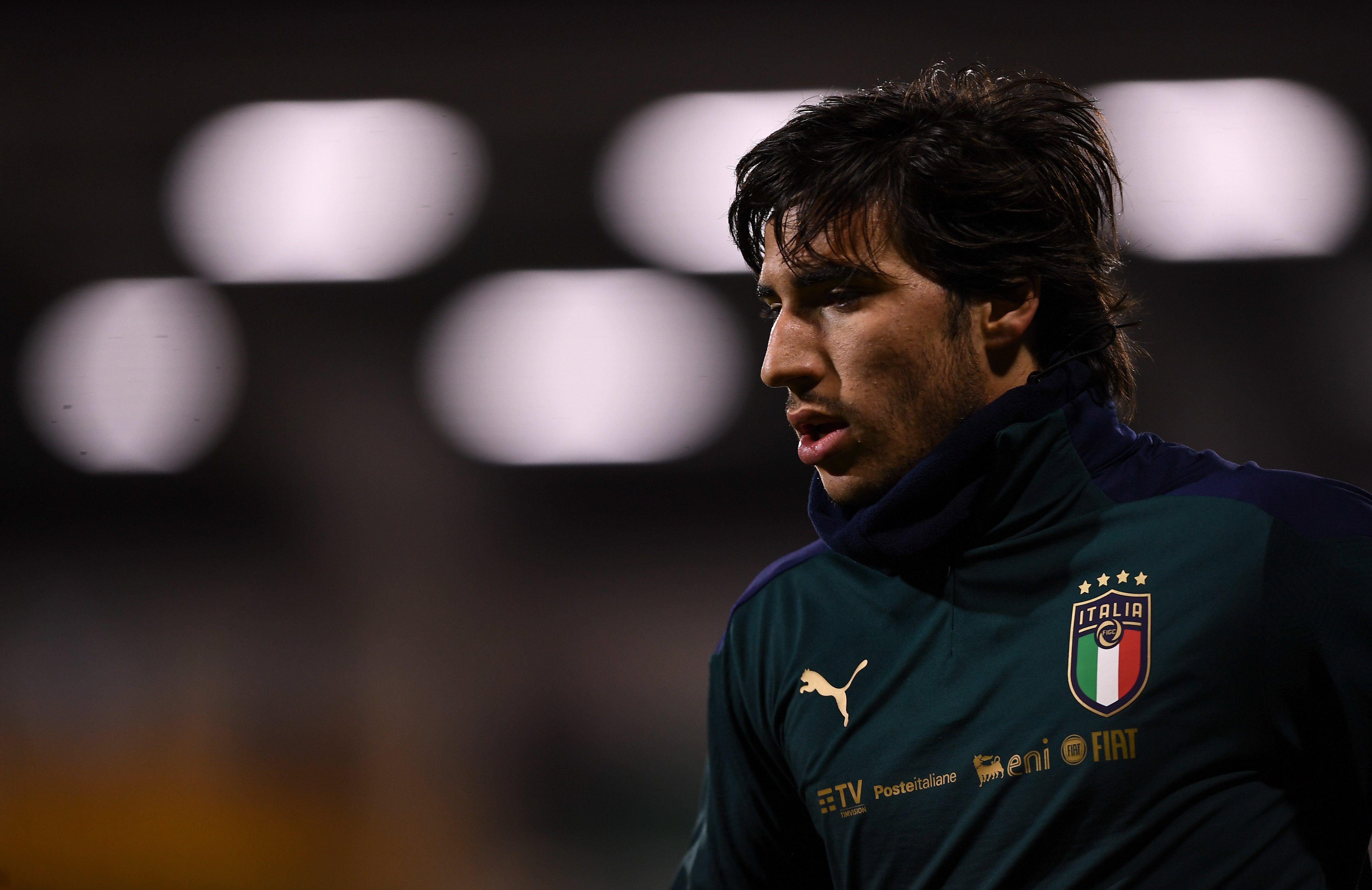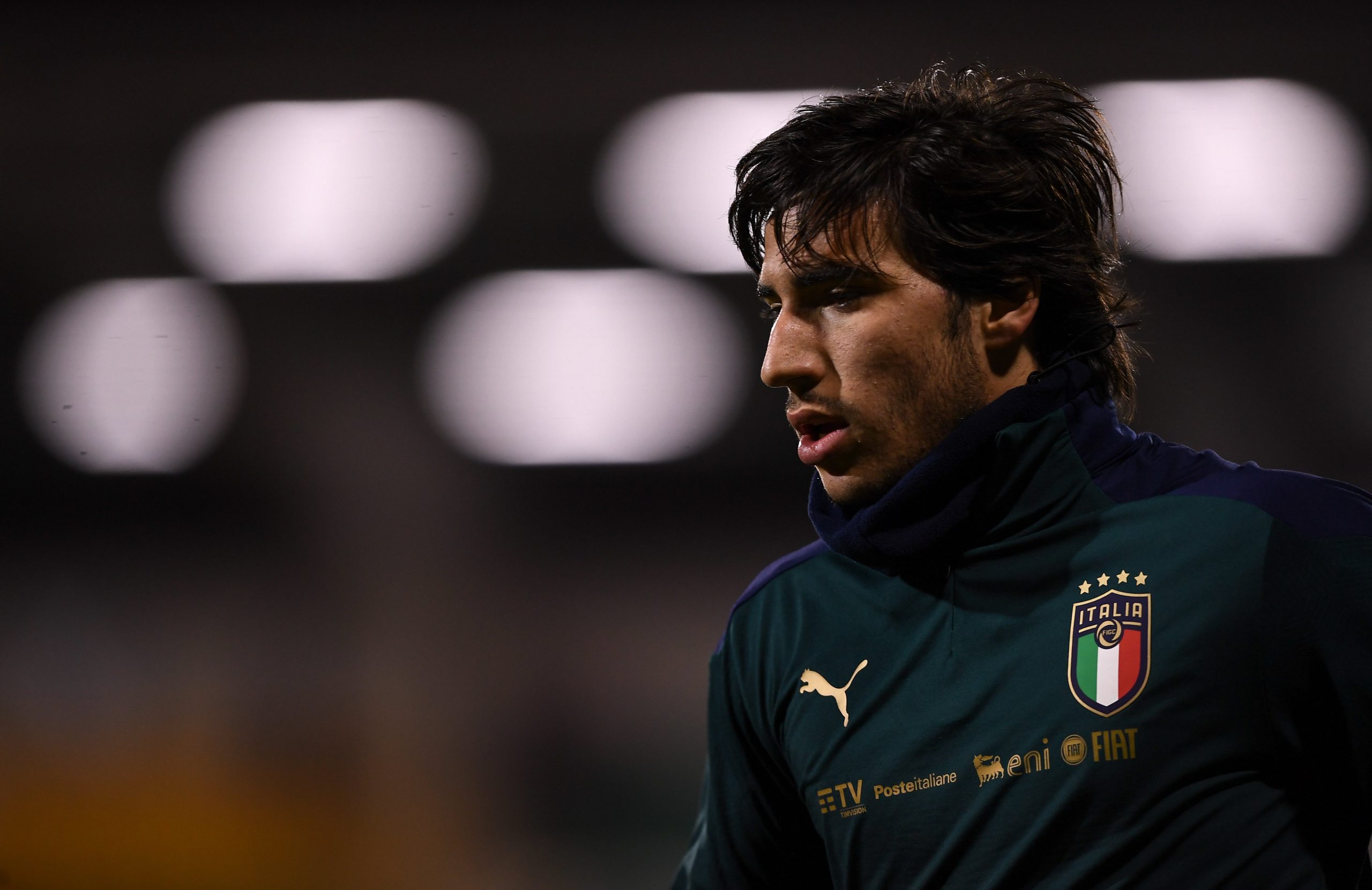
Newcastle United midfielder Sandro Tonali is set to serve a ten-month ban after being embroiled in a gambling controversy, but football’s love affair with the bookmakers continues.
After a string of betting breaches during his time at former clubs AC Milan and Brescia, Newcastle United midfielder Sandro Tonali was banned for up to ten months, leaving his fledgling Magpies career in free fall.
The 23-year-old is officially serving the first month of his worldwide football ban, handed down by Italian football authorities due to his involvement in betting activities on illegal gambling sites.
The Italian, a summer signing from AC Milan, will not return to availability until late August 2024, ruling him out of the rest of this season and the European Championships, should his country qualify. Subsequently, FIFA has officially endorsed this suspension, making it applicable on a global scale.
He must also attend treatment sessions for gamblers and give a series of public talks about his experience over a further eight-month period as part of a plea bargain with the FIGC. Under the terms of the ban, Tonali has also been fined $21,000.
The entire Italian betting scandal has resurfaced the talk around football’s failure to address the old-age problem or care for young players with gambling problems, as well as its continual partnerships with gambling companies.
The Unravelling of Sandro Tonali
Newcastle United signed Sandro Tonali from Serie A giants AC Milan during the summer transfer window, in what looked like a fantastic piece of business by the club. The Italian had shone in his homeland, helping Milan reach the semi-finals of the Champions League last season, and was seen as someone who could take Eddie Howe’s side to the next level.
After a dream debut that saw his score in a 5-1 win at home to Aston Villa in the league, disaster has struck in recent weeks with the news that Tonali has received a ten-month ban from football for breaching betting rules during his time as an AC Milan player.
It is a massive blow for Howe and anyone associated with Newcastle, and it immediately hurts their chances of going far in the Champions League as well as qualifying for the competition again next season.
What is even more concerning is that the FA have also reportedly started a separate investigation to find out if Tonali, who, according to recent statements from his agent, is a confessed gambling addict, has continued with his habit after shifting base to the English soil, which has the potential to lead to a further ban.
The entire fiasco first emerged on October 10, when 22-year-old Juventus midfielder Nicolo Fagioli was being investigated for using illegal gambling platforms and betting on football matches. He admitted to investigators in Turin that he had bet on illegal platforms. But he denied betting on matches involving his own teams.
He immediately aided the investigation as best he could in the hopes of getting a reduced ban. He handed his phone over, which widened the investigation, and the names of Aston Villa’s Nicolo Zaniolo and Tonali came to light.
A Tale of Two Sides
— Connor (@CH37083178) October 28, 2023
A few years ago, there would have been multiple articles condemning Tonali as a fool (talkSPORT still do). How could he, as an Italian international footballer, have brought upon himself a ten-month ban through gambling? The sheer folly of it is staggering. But you cannot help but feel there is a wider debate to be had — a discussion more worthwhile than chastising the player.
Seeking excitement is inherent in human behaviour. Whether we are eating food we like, watching movies, taking recreational drugs, or even playing football, we are motivated to participate in such activities because they give us a trigger for dopamine release. Gambling and betting are much the same.
The industry plays on this relentlessly. While gambling is not a physical substance, it can quickly develop into a physiological addiction similar to substance abuse if it gets out of control. The thrill of placing a bet and the possibility of winning big can be alluring, and the adrenaline rush that comes with it can be addictive.
In the words of Arsenal legend and renowned pundit Paul Merson, who suffered so badly from addiction to alcohol, drugs, and gambling that he set up a clinic to help eminent sports personalities deal with these issues, he insisted that gambling is “an illness” that “people need to understand.”
“This is an illness, people need to understand that”
Paul Merson discusses gambling issues within football as he reacts to news Sandro Tonali is under investigation for betting on AC Milan matches whilst he was a player at the club. pic.twitter.com/xzPw2VIdLh
— Sky Sports Premier League (@SkySportsPL) October 21, 2023
Merson also feels it is the wrong punishment for the player and club, believing FIFA and the Premier League need to show more awareness and support around those suffering from gambling addiction.
Throwing the book at high-profile figures who are struggling to overcome an addiction and hoping the problem goes away will not help the cause because it will discourage other footballers who are struggling with gambling addiction from coming out, confessing, and receiving the necessary therapy.
While it is a long road back to normal for Tonali, head coach Eddie Howe has already pledged his support to the player, who was greeted well by those at St. James’ Park and was given the honour of leading the victory lap at St. James’ Park with his teammates following their win over Crystal Palace.
Howe said, “The most important part of all this is Sandro and his welfare. It’s very easy for people to forget how young he is and the changes he’s had in his life coming from Italy to England—that’s hard enough to deal with, and now he has this situation.”
“Straight away we threw our arms around him and protect him and try and give him the love and support that he needs to find a solution to the problems he’s had, and that’s what we’re endeavouring to do with a lot of conversations and communication with him and his family.”
“It’s not just Sandro, it’s the people around him that are going to be so important to him as well. It’s been a big effort from us and I have to say he’s handled himself superbly well. Obviously emotional but he’s handled himself with respect and dignity.”
Unlike Ivan Toney, Tonali is believed to still be able to travel in to training every day like normal and get match fitness in friendly games, while it would have also been terrible for his mental state to be sitting at home separated from his colleagues.
A Game of Contradictions
There are strict rules and severe consequences for those in football who gamble. As high-profile role models, it is a minimal requirement that top-level players be aware of their responsibilities to ensure they help preserve the integrity of the game through professionalism and proper conduct.
But ultimately, Tonali is not alone, and the charges do in fact point to a wider problem that is standing right before our very eyes. The sport is awash with temptation, and the lure of betting is omnipresent. One cannot help but notice the football’s glaring contradiction. On the one hand, it vehemently prohibits betting within their ranks, while on the other, it openly promotes it.
UEFA and their individual football federations also deserve some of the blame when there are still eight EPL teams with prominent betting sponsors on the front of jerseys, with agreements that are typically worth £4 million to £6 million annually to each club. For a long time, the Football Association itself was sponsored by Ladbrokes.
Agree 100% Ross the hypocrisy is everywhere in Football, heard a podcast talk about Tonali and Gambling Addiction then they cut to an advert for a Sports Betting company. You couldn’t make it up
— Magpie Ranger (@MagpieRang89145) October 28, 2023
In Italy, Serie A banned gambling sponsors in 2019 after decades of partnership but had previously opposed a government ban on gambling-related advertising implemented in late 2018. At that time, Serie A clubs had 15 sponsorship agreements with betting firms, contending that the move was leading to a significant loss of crucial league revenue.
The Premier League apparently took the high road this spring when they instituted a “ban” on betting sponsors set to begin during the 2026/27 season. Although gambling companies might not be able to buy a team’s front-of-shirt sponsorship inventory, they can still advertise on clubs’ shirt sleeves, training tops, and stadium advertising hoardings.
It is ridiculous to make a moral stand while allowing placement all over different locations on the apparel and stadium. The Premier League might try to dress this up as an honourable act of altruism. But it comes at a time when the UK government has been considering a wider ban on betting sponsorship in sports and the imminent introduction of an independent regulator for English football.
The gambling-football nexus does not end at advertising; far from it. If Tonali betting on football matches looks like a conflict of interest, what of the fact that bookmakers and gambling entrepreneurs own clubs outright?
Brentford owner Matthew Benham made his fortune from a betting and data-analysis company, and advertising for gambling firms is everywhere at Premier League and EFL grounds. The same goes for Brighton chairman Tony Bloom, who built his wealth on the back of gambling businesses, including his specialist sports betting advice firm Starlizard, while Championship outfit Stoke City are owned by the Coates family via their Bet365 empire.
It is right that Tonali be sanctioned for breaking rules designed to protect the integrity of the game. But the powers that be in football can hardly presume to sit in judgment, wringing their hands over a player’s betting habits and handing out ridiculously lengthy bans that are unjust to the player’s current clubs when they themselves have shown little appetite to loosen their grip on gambling.
They are happy to endorse gambling, but at the same time, you will be hung out to dry if you fall into its traps. Undoubtedly, the intertwining nature between football and gambling will continue to be a complicated one as more instances of activity relating to the two become apparent across Europe.
